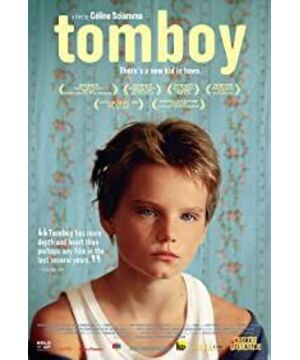The gender symbols of "man" and "woman"
are influenced by social norms such as culture, religion, and customs. We always have preconceived stereotypes about what "man" and "woman" should look like. With the passage of time and the evolution of society, the meaning of gender will also be adjusted and changed. Celine. In the film, Sciamma compares the sisters Lorra (Zoé Héran) and Jenny (Malonn Lévana), and makes a rough definition of the binary division between appearance and clothing: in clothing, 10-year-old Luo Children are mostly shown in shorts, T-shirts, vests, sports jackets, etc. The colors chosen are mainly white, gray, navy blue and other plain colors. Sister Jenny's body not only can see the pink skirt, but also the color of the clothes. It is also lively and brighter; in terms of hairstyle, Luo Er has short straight hair with a medium part, while Jenny has long hair with small curls. Obviously, the director deliberately put two completely different gender symbols on the two men, marking the universal images of "man" and "woman" respectively.
The floating nature of "gender":
once a person's social gender is inconsistent with his biological gender, he will often be excluded or discriminated against in the process of growing up, and it will also be described as God putting the soul in the wrong place In the body, however, if analyzed from the family or growth background, the development of social gender is actually traceable. In Lorre's case, it is clear from her interactions with her father (Mathieu Demy) that Lorre's gender development is heavily influenced by her father.
Parents are usually the first objects children start to imitate and learn from. For Luo Er, the father is obviously more attractive than the mother (played by Sophie Cattani). There are two scenes in the opening of the film to prove it: one is Her father taught her to drive; the second is that she and her father also play the game of sucking noodles with their mouths. Through these two passages, we can see the close connection between Luoer and her father, and also find that her father has special expectations for Luoer. The father did not raise Luo Er as a "woman" and did not let her play with stuffed toys or dolls - Simon. What Beauvoir refers to as a "passive thing"--holding her on her lap, teaching her to turn the steering wheel, turn the lights, teach her to drive a car--is considered a sign of masculinity and masculinity--obviously Father hopes that Luo Er can be in a position of initiative and control. In addition, the father's sentence "It's up to you next time" can be regarded as his father's affirmation and praise to Luoer. By giving Luoer the power to control the steering wheel, she has "existence". As for the behavior of sucking noodles, Luo Er inherits the unique position and advantages that others - for example: a sister who can't suck noodles - can't get it.
Feeling the power granted by her father, Luo Er knew that she was different, so she could not show her father's disappointment. When Luo Er was playing with the neighbor children as "Mick", she saw the boys standing on the grass to urinate together, and she could only hide in the woods, take off her pants, and squat to go to the toilet, which made her Understand the differences between the sexes and realize that no matter how hard you try to learn to be a "man" in explicit behaviors (such as playing football, shirtless, spitting), you can't change your biological sex. Simon. In Le Deuxième Sexe (1949), Beauvoir mentioned that girls would unconsciously exacerbate the phenomenon of enuresis after experiencing the shameful and inconvenient urination procedure. Therefore, Luo Er, who was shocked by this fact, accidentally dripped urine on his pants when he hurriedly put on his pants. In order to live up to the power granted by her father, and also afraid that her father would know that she was no different from an ordinary girl, Luo Er did not dare to let her father find out the fact of peeing her pants, so she had to hide in the bathroom to wash.
However, "gender" is actually a floating and unstable concept. While showing "Mick", Luo Er also reveals the identity of "Luo Er" from time to time. When Luoer was playing cards with her father, her father asked her to try drinking. At this time, Luoer existed as "Mick"; in the next scene, Luoer was lying on the sofa and sucking her fingers, and her father leaned her against him on her body, and kissed her head. At this time, Luo Er was obviously "Luo Er", enjoying the power of a girl who acts like a spoiled child and relies on adults.
Having said that, Lorre is still fascinated by the privileged position of "man" in society/group, especially after she acquires Lisa (Jeanne Disson) as "Mick" - the girl the boys look up to - After the love of , let alone give up the role of "Mick". When Lisa invited Luoer to play in the water with everyone, Luoer had a whim to squeeze the clay into long strips and stuffed it into the swimming trunks cut from women's swimsuits, adding a symbol of "man" to herself, filling the "man" A woman's innate lack (perhaps a manifestation of "penis admiration"?). Lorre has a "penis", a symbol of superiority and strength, which allows her to beat other boys in wrestling and also allows her to get kisses from Lisa. Having tasted the sweetness of the "penis", Luo Er carefully put the "penis" made of clay into a tin box with baby teeth after returning home, and treasured them together. Baby teeth symbolize growth, and "penis" is the alter ego of "man", representing initiative, independence, pride and omnipotence. The simultaneous possession of both makes Luo Er more determined to play "Mick". Luo Er asked her sister to help her trim her hair, and she also defended her sister's injustice, so as to confirm her sister's expectation that "brother will protect me".
My name is Luo Er: Luo Er's self-identity
always dresses herself up as "Mick". Luo Er is actually denying her biological gender and self-denial, so when her mother noticed it, she said to Luo Er, "I I don't mind you pretending to be a boy, but you can't go on like this." That is to say, Luo Er must first identify her biological gender, and then know herself, and at the same time let others know the real Luo Er, and then want to use "man" or "woman" "It's another thing to show someone's identity. The director uses the role of Luo Er to disrupt the stereotyped "gender" dichotomy, allowing Luo Er, who is wandering between "Luo Er" and "Mick", to find her own identity through groping. In this way, she can introduce herself confidently and happily: "My name is Luo Er."
View more about Tomboy reviews










